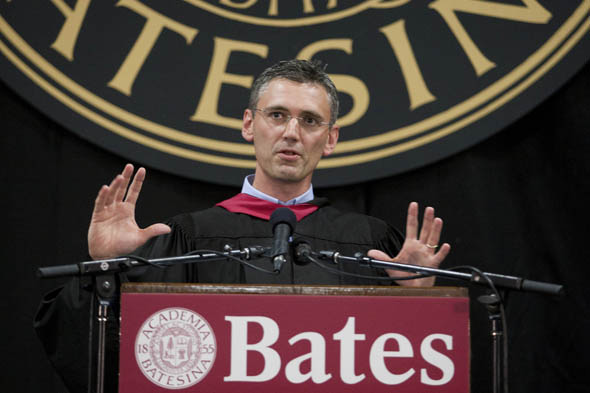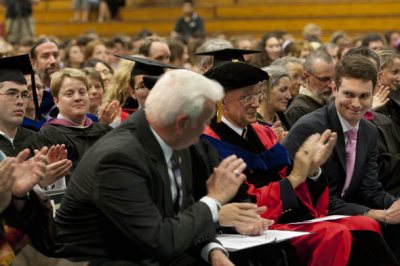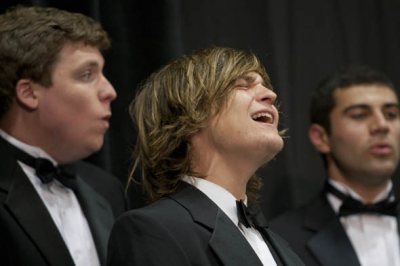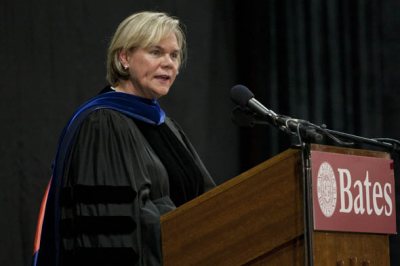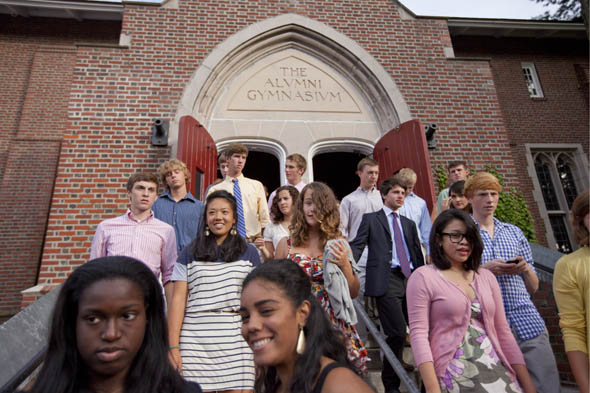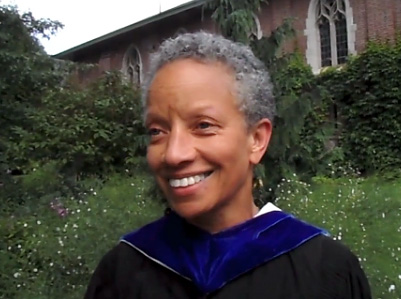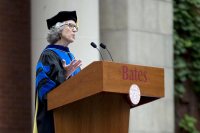
Don’t be ruled by social constructs, ‘Winning’ author tells Convocation audience
“Become a sociologist of concepts, or perhaps an archeologist of culture,” the Bates College Class of 2015 was told as the new academic year began — in other words, this is your time to understand, and redefine, the social norms that guide us through life.
That message was the centerpiece of Tuesday’s Convocation ceremony. Keynote speaker Francesco Duina, professor of sociology and author of a nationally noted analysis of the American preoccupation with winning and losing, shared the podium with interim President Nancy Cable, the college’s dean of the faculty, the president of the student government and others in welcoming 506 first-year and seven new transfer students to campus.
The Class of 2015, by the numbers.
Convocation in sound and image.
The threat of damp weather sent the ceremony inside Alumni Gym. Lewiston Mayor Larry Gilbert was among guests joining faculty, staff and students for the hourlong event.
Cosmin Ghita ’12, Bates Student Government president, welcomed the gathering by playing with the sociological concept of social constructs (and a bit of Harry Potter). But the crux of his introduction was the time-tested message that the first-year students have arrived not only at Bates, but at a point in life where they really must consider, and own, their decisions.
Members of the Class of 2015 have chosen Bates as the car dealer that can “provide the vehicle to get you to your destination” in life. “Bates will give you the best of what it has . . . but Bates will not drive you,” he said. “You’re responsible for getting to your own destination.”
‘Sociologists of concepts’
Pamela Baker ’70, a biologist and the college’s dean of the faculty since July 1, reminded the new class that these next few years are prime time for risk-taking — something also integral to the work of established scholars, who must submit their discoveries to the tests of public scrutiny.
Never again will these new students be so thoughtfully challenged, nor so well-supported in facing those challenges. “We will expect you to think about things from new perspectives, to ask difficult questions, to exercise creativity, to become a scholar in your own right,” Baker said.
“We stand with you at the threshold of your academic career at Bates. A liberal arts education, and a Bates education specifically, will prepare you for what you cannot yet imagine.”
Pointing out the high caliber of achievement needed to get into Bates, Baker called the new students “winners” — a passing note that resonated in Some Thoughts on Words and Time, Duina’s address.
He is the author of the book Winning: Reflections on an American Obsession, which scrutinizes that peculiarly American worldview whose poles are victory and defeat. The book was the summer reading assignment for the Class of 2015, and the topic of both Duina’s Convocation talk and an orientation weekend panel discussion.
Insightful and provocative, Winning seeks to explain our fixation on winning and losing, our collective beliefs about winners and losers, and what we’re really after as we struggle to win. Duina argues that victory is not a goal in itself, but a symbol of something immensely important: affirmation of our place in the world.
He suggests that the win-loss mindset can be an addiction cycle in which winning is ultimately nothing but anesthesia for an ever-growing sense of emptiness.
Duina laid the groundwork for his talk with two sharply contrasting sets of messages. On the one hand were repeating athletics spots, seen earlier that day on a video monitor in Merrill Gym, driven by the theme of winning. On the other: Jante’s Law, 10 principles for socially correct behavior that are ingrained in Scandinavian society and include such precepts as “Don’t think you are good at anything” and “Don’t think anyone cares about you.”
Specifically for his first-year listeners, Duina drew two lessons from the American obsession. The first was that these ways of seeing the world are not physical laws — they are only social constructs that can be examined, considered and used or discarded as one pleases.
In short, they are only words, if powerful ones. “There is really no need to subjugate yourself to whatever constructions happen to be dominant,” he said. At the same time, there is the exciting challenge of investigating those constructions, and in so doing, coming to better understand both society and ourselves.
“Use the resources of Bates to engage in some serious deconstruction and exploration, and then to rebuild and come away a rounder, fuller person. Become a sociologist of concept, or perhaps an archeologist of culture.”
For his second theme, Duina borrowed his father’s concept that life is time. Cycling through existence as an endless series of challenges presented and met, prizes sought and won, he said, leaves unanswered the central questions of our existence. “I invite you to treat your years at Bates with care, and not as a stretch of time on life’s treadmill.”
He said, “Indeed, in a way there should be no next step, no next challenge, but a simple unfolding of yourselves.”
‘Our shared anthem’
In her Invitation to the College Community, President Cable transcended the usual advice to the newbies, instead asking the entire campus community to rally around the values and goals that constitute the essential Bates. From The Good Life, the final book written by the late Rev. Peter Gomes ’65, Cable adapted the formula of “three timeless pillars of a respectable college education”: humanity, virtue and piety.
For Cable, “humanity” speaks to our ever-present “opportunity, the individual choice . . . to follow precepts of kindness, benevolence and shared dignity with our human brothers and sisters and with the world in which we live.”
If virtue’s meaning tends to shift with the times and across cultural norms, she said it now “invites us to consider actions that reflect excellence, principles of goodness and fundamental fairness.”
And while piety is hard to divorce from its religious connotations, Cable suggested that for Bates it invites a “humbling respect . . . for principles so beautifully outlined in the Bates Mission Statement,” revised in 2010.
She requested that the audience “listen for your part in Bates’ mission and its work as a college in the year ahead” as she read the mission statement.
“This is our shared anthem, all of us and each of us.”
The program also featured well-received performances by the Deansmen and the Merimanders, Bates’ oldest a cappella ensembles, and a benediction from the Rev. Bill Blaine-Wallace, Multifaith Chaplain.
Blaine-Wallace led a moment of silence in the memory of economics professor David Aschauer, who died in August; and offered a series of hopes for the community that included, “May we not go it alone.”
